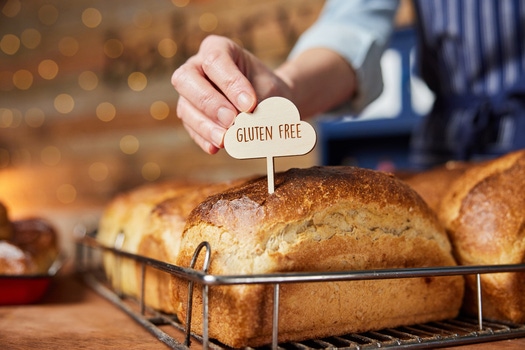
Do You Need to Avoid Gluten?
Nicola Perry APD
Gluten free has become well known in the world of diets, and while one in 70 New Zealanders have been diagnosed with coeliac disease and medically must follow a gluten free diet, 10 times this number follow a gluten free diet by choice.
So what exactly is gluten and should you be cutting it from your diet? Our Sanitarium Accredited Practising Dietitian Nicola Perry helps us get down to the facts.
So Nicola, what is gluten?
Gluten is a naturally occurring protein found in wheat, rye, barley, and triticale. It’s the ingredient which gives bread its fluffiness and elasticity, and is commonly used as a stabiliser in food products to prolong shelf life.
A gluten free diet means avoiding all gluten-containing grains, all foods containing related ingredients and any food that may have been cross-contaminated with gluten. Gluten can hide in unexpected places, making it essential to learn how to read labels, avoid cross-contamination, and ensure your body gets the nutrients it needs.
Who needs to go gluten free?
People diagnosed with coeliac disease must follow a strict gluten free diet for life. For these people, the smallest exposure to gluten can cause symptoms such as fatigue, nausea, abdominal pain and difficulty concentrating. For people with coeliac disease, eating gluten can also compromise nutrient absorption, causing nutrient deficiencies like iron-deficiency anaemia and increase risk of osteoporosis.
A gluten free diet may also be recommended for people with non-coeliac gluten sensitivity (NCGS). People with NCGS show all the symptoms of coeliac disease but have no detectable immune reaction to gluten. For this reason, it can be very hard to diagnose, but generally these people feel considerably better avoiding gluten. Fermentable carbohydrates can also trigger similar symptoms, including for those with irritable bowel syndrome (IBS) so it’s important to know if it's gluten or FODMAPs that are causing symptoms.
If you believe you would benefit from a gluten free lifestyle it's best to consult a medical doctor or accredited practicing dietitian before making any major changes to what you eat.
Download our free nutrition fact sheet for expert dietitian advice on coeliac disease.
Nicola, as a Dietitian, can you tell me, is it healthy to go gluten free?
It's important to understand that being gluten free doesn’t necessarily mean being healthy and for people without coeliac disease or non-coeliac gluten sensitivity there’s no evidence that following a gluten free diet is better for your health. Gluten free diets tend to be lower in fibre, wholegrains, and some key vitamins and minerals, all of which are important for a healthy gut and overall wellbeing.
You may have heard the hype around gluten free diets reducing inflammation or supporting weight loss. A gluten free diet certainly reduces inflammation in those with coeliac disease, however there is very limited evidence to say that this is the same for those without coeliac disease. Gluten aversion may actually be associated with adverse side effects for individuals without coeliac disease. If wishing to explore ways to protect against inflammation including more plants and embracing healthy fats in your diet.
Evidence does not support the claim that a gluten free diet is beneficial for weight-loss and it is shown that for individuals without gluten sensitivity or coeliac disease, the consumption of a gluten free diet appears to have no nutritional benefit. For someone with coeliac disease, a gluten free diet can actually cause healthy weight gain as the small intestine lining heals and is better able to absorb and use food.
How restrictive is a gluten free diet?
There are more menu options for those who need to follow a gluten free diet than ever before. There is also a growing number of gluten free products available – with many supermarkets now having sections dedicated to dietary needs, but it can still be a minefield knowing which products are gluten free, so we recommend to just keep an eye out for product labelled ‘gluten free’ or which displays the Crossed Grain Logo.
It’s important to get advice from a dietitian to ensure your gluten free meals are nutritionally balanced and as varied as possible.
There are plenty of wholesome grains that are naturally gluten free including sorghum, corn, rice, millet, amaranth, quinoa and buckwheat. These grains also form the basis of most gluten free products. Look for options that are high in gluten free wholegrains such as sorghum, brown rice, and quinoa, and provide a source of fibre.
Can you cook with gluten free products without compromising taste?
Yes! Fresh fruits, vegetables, legumes, dairy foods, nuts, seeds, fish, meats and oils are all naturally gluten free. And there are plenty of nutritious and delicious packaged options to incorporate into your cooking too.
Many recipes are also able to easily be adapted to be gluten free by using gluten free ingredients, including our Gluten free Weet-Bix banana choc loaf, our Gluten free Weet-Bix fruit stacks, our Baked kumara with cottage cheese filling recipe, and even our famous Weet-Bix Slice are just a few examples.
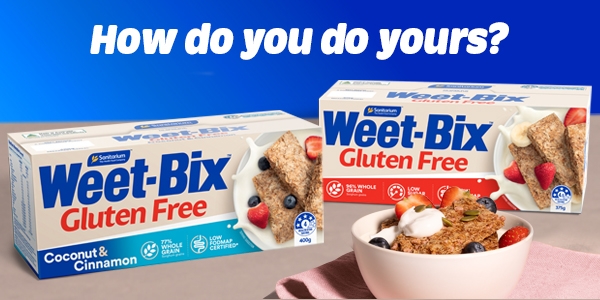
Where can I get more information?
There are a few resources that are trustworthy which I’d recommend for people adopting a gluten free diet to access.
For more information on coeliac disease or following a gluten free diet a great resource is the Coeliac New Zealand website. We have also created a free nutrition fact sheet where we share expert dietitian advice on coeliac disease – you can download that for free here.
Looking for some gluten free recipe inspiration?
Try one of these tasty snacks...
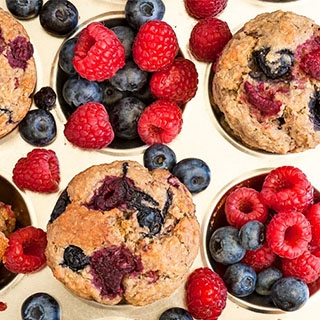 | Gluten free berry nice muffins are packed full of juicy raspberries and blueberries, and perfect popped in a lunchbox or enjoyed with a hot drink. |
 | A great treat for kids' parties, school lunchboxes or that after school snack. |
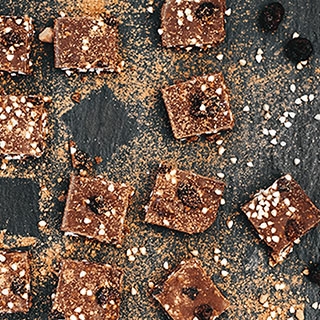 | Peanut butter chocolate squares This easy to make treat is dairy and gluten free and makes an excellent Easter special occasion food. |
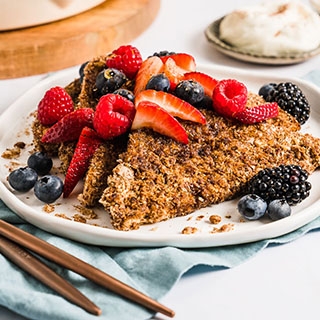 | Give your weekend French Toast an extra crunch-factor with the goodness of Weet-Bix Gluten Free! |
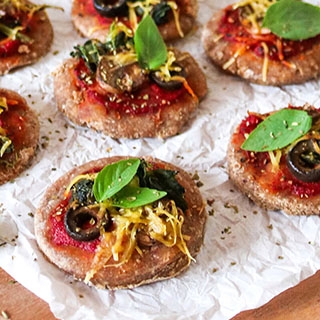 | These cute mini gluten-free pizzas are perfect for bringing along to any type of get together. |
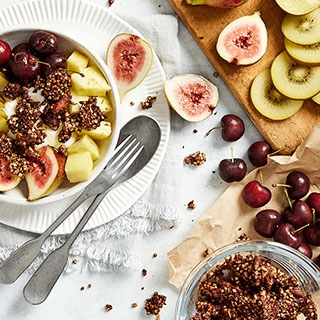 | These easy to make gluten-free clusters are super crunchy and nutritious. |

The latest nutrition advice, plus health and wellness tips delivered to your inbox monthly

